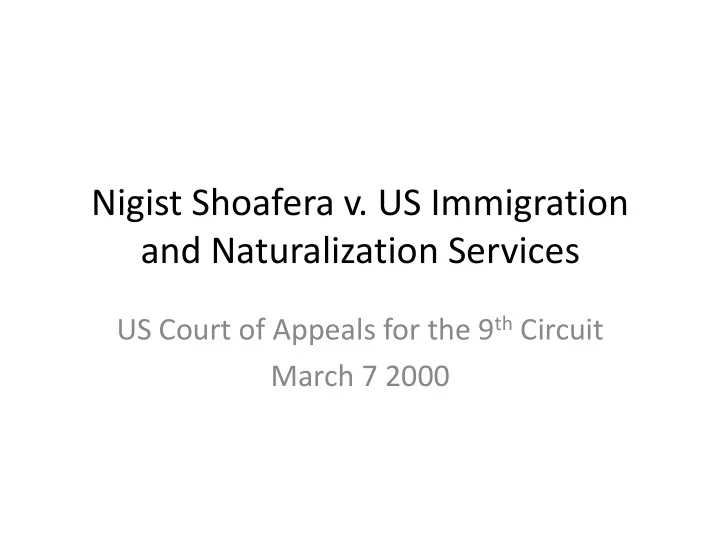

Nigist Shoafera v. US Immigration and Naturalization Services US Court of Appeals for the 9 th Circuit March 7 2000
Facts • Parties: Nigist Shoafera v. US Immigration and Naturalization Service • Country of origin: Ethiopia • Cause of flight: Fear of retaliation for reporting rape • Court: US Court of Appeals for the 9 th Circuit • Proceedings: - Decision of the Immigration Judge and the Board of Immigration Appeals: not eligible for asylum - had not proved that she was persecuted because of ethnicity
Issue • Did Shoafera establish that she was persecuted for reasons of ethnicity?
Rule • U.S.C: § 1101(a)(42)(A); Shoafera must show that she is unable or unwilling to return to her home country “because of persecution or a well-founded fear of persecution on account of race, religion, nationality, membership in a particular social group, or a political opinion.” • Standard of review: - Limited to the administrative record - The Court will affirm the BIA´s decision if it is supported by reasonable, substantial and probative evidence in the record
Analysis • Burden of proof: claimant has to prove fulfillment of the requirements • Standard of proof: credible, direct and specific evidence • Reversed burden of proof: the immigration authorities have to prove that, due to changed conditions, the applicant no longer has a well- founded fear of persecution
Analysis • Interpretation of facts: - Given the evidence in the record, including Shoaferas credible testimony, and the testimony of the sister, we can conclude that Shoafera was persecuted, in part, because of her Amharic ethnicity • Legal argumentation - Rape may constitute persecution • Fairness of the decision: - No assessment of whether she belonged to a particular social group (but this is up to the claimant to bring to the Court ) - No assessment of a well-founded fear - No weight given to inconsistencies in testimony
Conclusion • Petition granted, remanded to the Board of Immigration Appeals for further proceedings
Analysis of the dissenting opinion • Opposing views: - Different review standard - Different interpretation of the evidence - Different standard of proof • Gaps in the dissent: - Testimony may show mixed motivation - How can the judge know if a person is contradicting herself because she is lying or if she is nervous? • Conclusion - Not eligible for asylum • Fairness of the decision?
Counter analysis
Recommend
More recommend